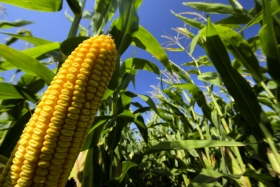Ethanol: Worse Than Conventional Fuel?

Ethanol was pitched as the new hope for alternative fuels in America, but what if itís actually worse than conventional gasoline? Thatís exactly what a new government-funded study is saying in an analysis of cellulostic ethanol ó fuel made from byproducts like the leftovers from growing corn.
The study suggests that while ethanol might cut emissions in the long term, in the short term, it actually produces 7 percent more emissions than gasoline. That means it canít meet the emissions targets and goals set by the 2002 CAFE Standards along with the Obama Administration and government officials to reduce American contributions to global climate change.
Whatís the problem with ethanol? There are two issues of concern, and the first involves the material used. Traditionally, when corn and other crops were harvested, the stalks, leaves and other byproducts were left on the fields and plowed back into the soil to enrich it. This also trapped carbon. By removing these materials to make ethanol, fuel producers are actually releasing trapped carbon, and theyíre degrading the quality of the soil, which is an issue of growing concern across the agricultural sector, where unsustainable farming practices are wreaking havoc on farmland.
Thereís another concern, though, which involves the clearing of land for ethanol production. When forests and other natural regions are slashed and burned to create room for crops used to produce ethanol, that releases substantial atmospheric carbon. Ethanol production methods compound the problem by failing to trap carbon in the soil, creating a vicious cycle that contributes to growing emissions. When more and more crops are diverted to ethanol production, land has to be cleared elsewhere to make room for growing food to feed people, and the problem compounds itself.
The federal government, which has invested billions in the production and promotion of ethanol, isnít happy with the study, and is already trying to counter the findings. So are industry and trade lobbyists, who are in no hurry to see the ethanol industry disappear right before their eyes. If additional studies support these findings, they fear that the governmentís support for ethanol will wane, making it much more difficult to continue to develop the industry.
However, that might not necessarily be the case. The research shows that existing sources of feedstock for biofuels are poorly chosen, but it doesnít necessarily say anything about ethanol itself. If the industry can find better sources of feedstock ó like materials that are currently going to landfills ó it could potentially develop an ethanol that is every bit as green as was originally promised.
Read more from our affiliate, Care2.
Corn image via Shutterstock.
2014©. Copyright Environmental News Network